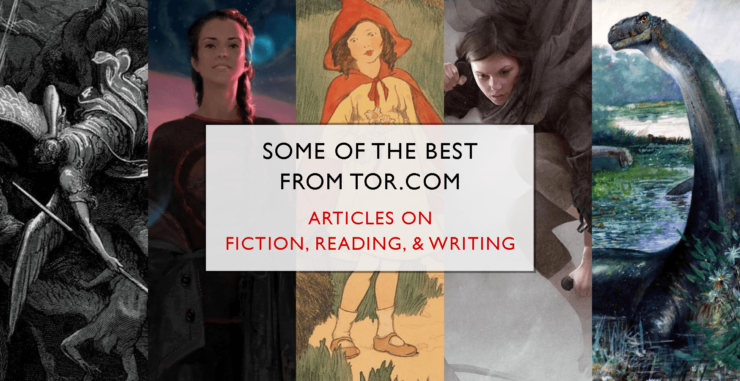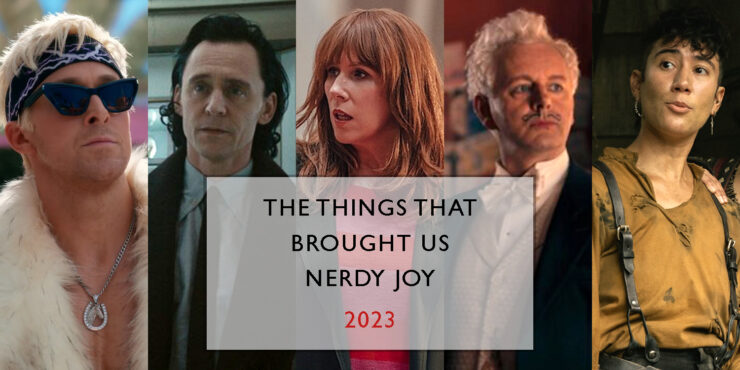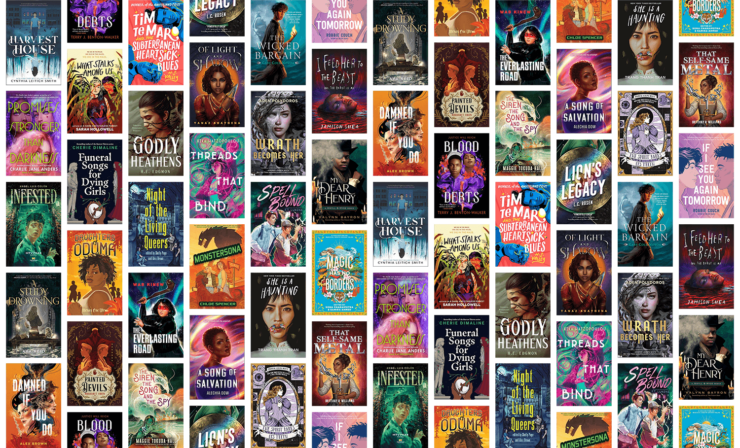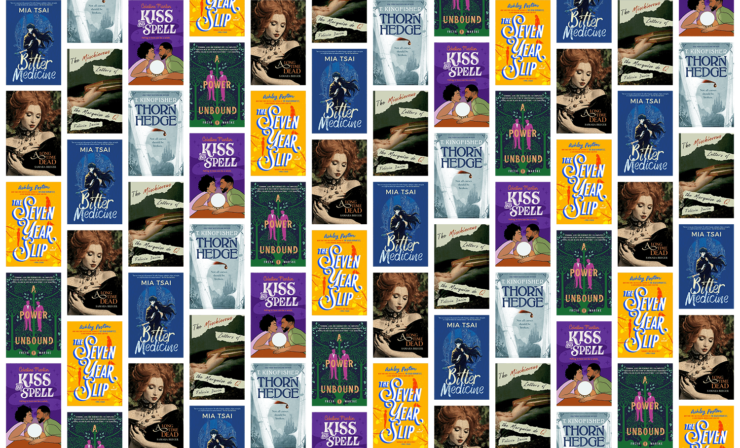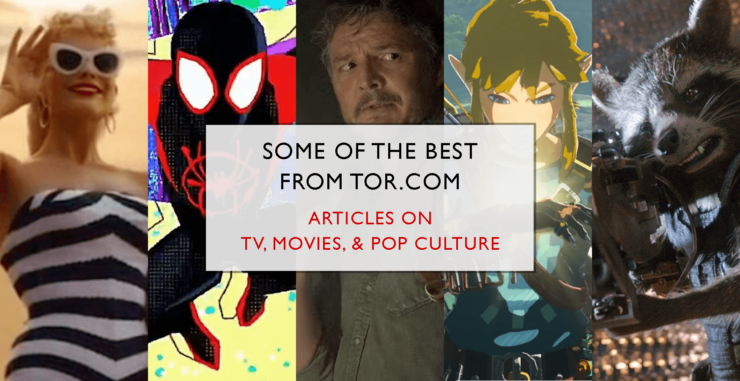Once again, it’s time to look back at some of our favorite non-fiction articles from the past year! Below, we’ve rounded up many of our favorite essays about books, reading, writing, and storytelling—there will be a separate list of articles discussing TV, movies, and other media coming soon.
While our end-of-year lists are focused on standalone essays and articles, we’re also incredibly proud of our lineup of regular columns (including two new series, Dissecting The Dark Descent and our Elantris Reread), along with the amazing array of fiction recommendations and discussion provided by our many wonderful contributors. This was a banner year for Tor.com—we started things off with Space Opera Week, celebrated our 15th Anniversary all summer long, and at one point, experienced a full-on Tingle Takeover (and yes, it was life-changing).
There’s so much more to come in 2024—for now we hope that you enjoy the selections below, and since these are just some of our favorite book-centric essays from the last twelve months or so—we couldn’t possibly include everything we love—please feel free to tell us about the articles, columns, and discussions that have stuck with you this year!
Taking Inspiration from Beloved Fantasy Series…
“The Long Defeat”: Reading Tolkien in the Time of Climate Change by Alyssa Hull
Climate change was already occurring during the years when Tolkien lived and wrote. Though he may not have been aware of a growing knowledge of global warming, I think his work is directly applicable to all of us who face the current onslaught of frightening headlines about climate disasters and think, like Frodo, “I wish it need not have happened in my time.”
What Makes A Knight: The Continuing Influence of Alanna of Trebond by Esme Symes-Smith
I was genderqueer but I didn’t have the words to explain myself yet (and wouldn’t for almost twenty more years), but I did have a role-model: Alanna of Trebond, Tamora Pierce’s first Lady Knight. The Song of the Lioness Quartet follows Alanna from an aspiring page to a fully qualified knight, as well as her journey from a girl pretending to be a boy called Alan, to being confidently and exactly Alanna.
Sazed Is a Reminder That Everything You Create Matters by Ratika Deshpande
We can never have enough new perspectives, enough art, enough stories. Sazed and the Keepers were always searching; they knew that they didn’t know everything. And they didn’t just preserve what had already happened in the past, but also what was going on around them […] In a way, the Keeper’s work will never be done, because as long as there are people living, there will be stories to preserve.
Exploring Issues of Family and Identity
Mother and the Wolf: Maternal Power in Fairy Tales by Julie Phillips
To venture into the forest is a hero’s deed. To take up one’s feelings of maternal depression and weave them into a story, as Le Guin did, is a hero’s deed. I believe that there is more than one matrix into which mothers must descend. One is for the artist, who follows her muse into the core, where the language is hot and the images smolder. Another is for the mother who must reckon with her volcanic emotions: anger, resentment, despair, too much love. Entwined, they become a hero’s tale about the most basic work of being human, nurturing one’s soul.
Mirror, Mirror in the Ward by Ava Reid
There are no mirrors in a psych ward. Broken glass can too easily be fashioned into a weapon—as the fairy tales will warn you. Despite this, I still saw myself reflected back. […]
A book is a portal, much like Alice’s mirror. But unlike a mirror, which reflects only physical reality, a book builds its own symbolic world around you. It can be the shelter of a grand castle. It can be the promise of adventure at the prow of a ship. It can be the mystery of a gloom-cloaked forest. As Ursula K. Le Guin said, a book is not ephemeral. It lasts. It is reliable. There has always been a castle, a ship, a forest. So I began to trust this world within the pages—slowly, shakily, but irrevocably.
Parenting an Idea in Saga by Natalie Zutter
That’s what makes Saga endure so well: Like Hazel, it grows into something new with every break and return, and its place within our comics universe—and its readers’ own personal universes—shifts. Having celebrated its ten-year anniversary a year ago, it hasn’t abandoned its opening line (This is how an idea becomes real), but rather has embraced how it’s not as simple as releasing an idea into the ether; you have to nurture it, even when you feel that you can’t possibly do so, to ensure its survival. And, most crucially, you have to let go of your expectations for what ideas your idea wants to create.
Food, Family, and Colonialism in Trang Thanh Tran’s She Is a Haunting by Wen-yi Lee
Meals have been a stage for Asian families in books across genres, from the plentiful dinners in Fonda Lee’s Green Bone saga to the likes of Crying in H Mart and The Vegetarian. There’s that stereotype about Asian parents: emotionally unavailable, communicating only through bowls of cut fruit and your favourite snacks magically stocked in the fridge, et cetera, et cetera. Even as the secrets threaten to crack the family apart, there’s a father in the kitchen, peeling prawns for dinner, obsessing over the flavours, the ingredients. The things he can navigate so much more easily than a daughter. Even when the supernatural warns you against it, food is family and homeland, and the hunger for that can overpower all else. In this house, you eat connection
Literary Criticism and Textual Analysis
Tracing the Affinities Between Susanna Clarke’s Piranesi and C.S Lewis’ The Magician’s Nephew by Iona Glen
Clarke also professes an “old longing” to find Lewis’ Wardrobe, the portal that first leads the Pevensie children into Narnia. Yet it is The Magician’s Nephew, Narnia’s origin story, that has perhaps the most profound influence upon Piranesi. The affinities between the two books illuminate the major themes of both, particularly their interest in the ethics of scholarship and different ways of knowing. Piranesi’s reworking of Lewis reveals just how profoundly our childhood reading can shape us, providing us with our first Other Worlds to explore.
Reading Naomi Novik’s Scholomance Series as a Response to Ursula K. Le Guin by Elyse Martin
This is at the heart of Novik’s imaginative future; this is her response to Le Guin’s call to action. We live in a world like that of the Scholomance series, where certain societies are safe because they have built their success on the sacrifice of others: the vulnerable, the colonized, the weak. But this is a very shaky foundation. The greed upon which society grows will ultimately consume it, particularly if, as in The Golden Enclaves, the powerful only agree to find a new way forward when it becomes “a matter of immediate self-preservation”.
Speaking Truth Into Being: Trans Identity in Ann Leckie’s The Raven Tower by Logan Dreher
Against this backdrop, Eolo asserts his certainty, his wholeness. He is not broken or less than. He already is who he is. Eolo is powerful because of his trans identity, not in spite of it. He is able to intervene in the plot of the novel because his trans experience has taught him how to interface with gods. In The Raven Tower, trans people are not confused or broken, and their trans identities are not an absence or a lack, but a presence, a power.
Are We the Baddies? Magic and Normativity in The Locked Tomb Series by Kristen Patterson
Muir has created a universe in which we root for necromancers—and their cavaliers!—as naturally as we’d root for any other protagonist. Now in book three, she’s complicated that dynamic, pushing the world of necromancy away to the distance where it starts to look less familiar. At that point, we’re forced to reevaluate and ask, “Why necromancers? Why the kind of magic that bleeds and oozes?” It’s an invitation to think more deeply about the overall themes of the Locked Tomb books—about bodies, death, grief, and the boundaries we draw and then sometimes erase between ourselves and others.
Wrestling With the Current Cultural Moment
The Problem With Small Town Witch Romances by Jenny Hamilton
While some of the books under discussion here do include BIPOC characters (and even BIPOC love interests), the idyllic quaintness they’re reaching for depends on the erasure of America’s centuries-long persecution of Black and brown communities. It’s a conundrum you can see authors struggling with: The towns must be old if they are to be picturesque; but they can’t be old without having also been implicated in this country’s violent history; but the violent histories can’t be talked about because they bring down the vibe. The compromise (white) authors tend to strike is simply to pretend that American history didn’t happen, or at least didn’t happen in this place to these people.
Why Do We Still Love Robots in Fiction When They’re Taking Our Jobs IRL? by Samit Basu
For writers and artists, the threat of the industries we work in being thrown into (deeper) chaos because some corporate person decides to cost-cut/IP-hoard/Replace Annoying Humans is already very real. Which is why it was interesting for me, over the last few years, to on the one hand become increasingly irritated by the advance of the AI takeover, turn down various projects where tech people wanted me to help train AI to replace human authors—and on the other hand, keep working on a novel where two of the three main characters were robots, and also people whose feelings, rights and welfare I cared deeply about because I loved them. Which brought me to the question—why do we still love robots/AI in fiction when we increasingly don’t in real life?
Mid-Apocalyptic Fiction: Writing Against a Climate Catharsis by Theodore McCombs
The mid-apocalyptic climate stories also enforce on an emotional level what the science tells us: that we are intimately accountable to the world that comes after us. Apocalypses let us off the hook: What’s the point of trying if the Earth is doomed? How can this clean bus program or that wetland conservation project—not to mention one ordinary person’s decisions—matter at all, against those stakes? But climate change will not erase the slate; any future world will remember, in a ruthlessly embodied and practical way, in its scars, decisions we make and don’t make over the next few decades.
Staring Into the Void…
The Land Beyond Spacetime: Dinosaurs and Cosmic Horror by Fletcher Wortmann
The second thing that children learn about dinosaurs is that now, in the present day, all the dinosaurs are gone. I wonder: prior to the dinosaur boom in popular culture in the 1980s and ’90s, how many children under the age of five knew the definition of the word “extinction?” And we aren’t talking about the extinction of a single species, not just the sad likelihood that someday soon there might not be any more snow leopards or sea turtles: we’re talking about planetary extinction, an event that obliterated every living animal bigger than a guinea pig, not because of hunting or pollution but preordained by the random trajectories of chunks of rock tumbling through a vast, indifferent cosmos.
Every Space Story Is a Horror Story by Emily Hughes
The thing about the void is, that void doesn’t hate you. The void doesn’t know or care that you exist, nor would it know or care if you stopped existing. The void just kind of goes on voiding, infinitely. This is, when you get right down to it, the basic premise of cosmic horror: space is unknown, unknowable, indifferent, and exists on a scale that’s incomprehensible to humans. Its mere existence is enough to instill spontaneous ego death. And every story that takes place there is inextricably linked to that enormous absence.
Art in Defiance of the Endless Cosmic Nothing by Chuck Tingle
People often ask me—in a variety of different ways—how they too can become a successful writer. The truth is, I have no idea what journey will work for you. What I can speak on, however, is the journey that works for me.
With this in mind, I’ll offer up the simplest distillation of my own creative process: love is the most powerful artistic fuel there is, and I’m not afraid to use it.
Allow Me To Make a Gentle Plea For More Space Horror by Kali Wallace
Horror can serve a lot of purposes in storytelling, aside from the obvious one of scaring our pants off for fun. It’s also a way to explore fears and anxieties, critique traditions and societies, and examine prejudices and assumptions. But one thing that makes horror especially powerful in space-based science fiction is this: it is one of the best ways we have to make personal, intimate, and immediate things which might otherwise feel too big, too strange, or too remote for intense emotional impact.
New Ways of Looking at the Classics
John Milton the Space Poet: Early Traces of Science Fiction in Paradise Lost by A.J. Rocca
At times, Paradise Lost even seems to border on something like space opera: the angel Raphael hints at the existence of other worlds and extraterrestrial life, and Satan’s journey through the void to reach Earth is nothing less than an interstellar space flight. Milton was sometimes able to anticipate science fiction because of his engagement with the astronomy of his day, especially the new Copernican astronomy which laid the foundation for so much of SF’s interstellar fabulations. While I won’t go so far as to say that Milton himself was an SF writer, I do think we should at least acknowledge him as some kind of literary precursor: a space poet.
Little Worms: Mary Shelley and the Noodle that Created Science Fiction by GennaRose Nethercott
When ancient Etruscans served up the world’s very first bowl of pasta, they had no idea that humans would still be dining on the dish nearly twenty-three hundred years later. Nor could they have known that their simple meal would one day lead to the birth of one of history’s most feared and beloved monsters. In fact, a single humble noodle would go on to change the course of all of English literature.
Mark as Read
Molly Templeton’s Mark as Read column, now in its third year, gives readers a place to talk about the things that connect us (and occasionally frustrate us) as lovers of books. Over the last twelve months, the column has ruminated on the concept of reading dealbreakers and other ways reading can be weird or hard or personal, pushed back against the idea that readers are “consumers of books,” and found a new way to think about the books we’re not reading… yet. All that, and Molly still has time to ask the tough questions, like “Where Are the Lady Gandalfs?” and “What Does a Dragon Look Like?” You can find the full list of columns (and the conversations they’ve inspired) at the series page, here.
***
That’s all for now, but keep an eye out for the second half of our 2023 highlights coming up in the new year, where we’ll be talking all about old and new movies, TV series, and other pop culture favorites. In the meantime, if you’re feeling nostalgic, you can always check out our “Some of the Best…” article round-ups from previous years: 2022’s Fiction Articles list and Film, TV & Pop Culture list; 2021; 2020; 2019; 2018; and 2017. Happy reading!










